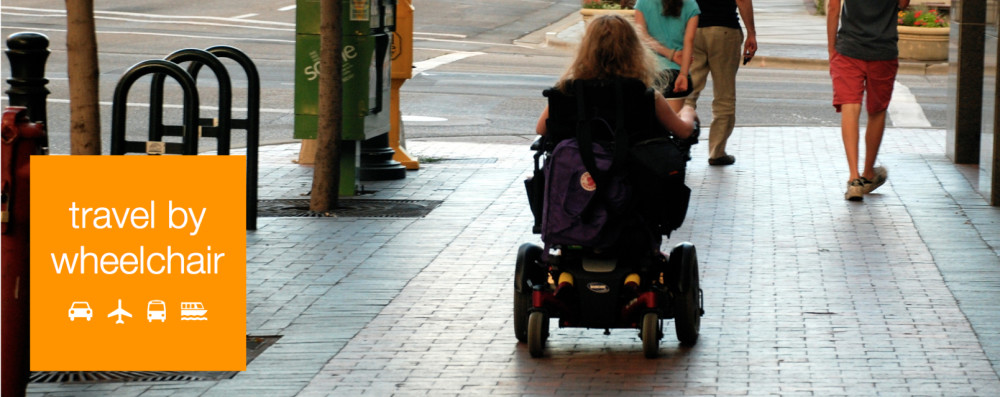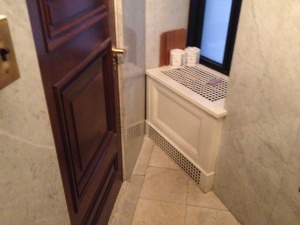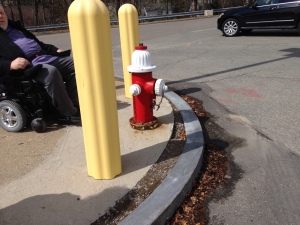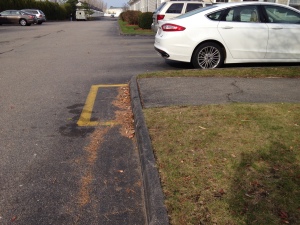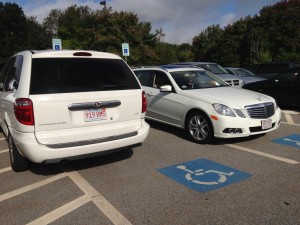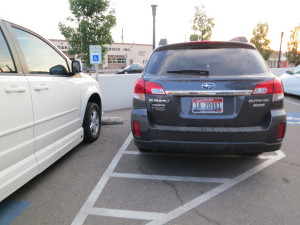Winter is coming, and with it, there will be lots of bad behavior in the Boston area. I’ll get ahead of the season with an early rant. Here are some things that make me scratch my head in puzzlement (on a good day) and bring on that fractious feeling (on a not-so-good-day).
Misleading signage. Like this supposedly ADA-compliant bathroom at the Boston Athanaeum.
What is accessible about this bathroom? I’ll tell you. Absolutely nothing. A little baby wheelchair could not even begin to fit in this room. The lack of grab bars add insult to injury.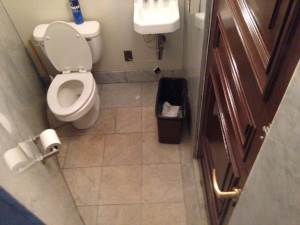
The promise of accessibility. Route 9 in Newton has undergone a transformation over the past year, with shopping opportunities galore. The plaza that includes Wegman’s has a fully-accessible parking area, complete with more accessible parking spaces than you could want; clear, wide sidewalks; a myriad of curb cuts; and an accessible, pedestrian walkway across Route 9 over to The Mall at Chestnut Hill. But, oops. If you use a wheelchair, you hit a full-on dead end…. with all that glittering allure of Bloomie’s just about out of reach. The developers of both of these malls must have spent tens of millions of dollars designing and building these respective spaces, and they got so so close to getting it right. They need to finish the job.
The “Now You See It, Now You Don’t” Phenomena. Here are two examples of perfectly accessible spaces that have been made inaccessible by the placement of pretty things for you to buy (in the Whole Foods case) and trash barrels (Walgreen’s, below).
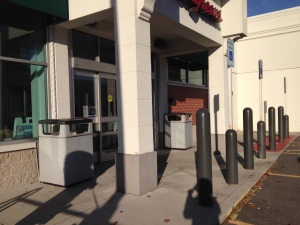 In both parking lots, there are plenty of spaces, there is good signage, and there are ramps and curb cuts. In the Whole Foods parking lot though, a wheelchair user must navigate through the parking lot upon exiting the door. Yes, there are yellow pedestrian lines in the lot, but you take your life in your hands competing with the harried drivers. It’d be much safer to be able to stay on the sidewalk for as long as possible. Or hey, maybe just go to Wegman’s, because they are an ADA-compliant dream.
In both parking lots, there are plenty of spaces, there is good signage, and there are ramps and curb cuts. In the Whole Foods parking lot though, a wheelchair user must navigate through the parking lot upon exiting the door. Yes, there are yellow pedestrian lines in the lot, but you take your life in your hands competing with the harried drivers. It’d be much safer to be able to stay on the sidewalk for as long as possible. Or hey, maybe just go to Wegman’s, because they are an ADA-compliant dream.
And in the “What Were They Thinking?” category we have the Atria, a big assisted living facility in Quincy, with three designated handicapped-parking spaces. Yup, three, for a facility which serves a population with the median age of about 87. In the five years in which we have been visiting my aunt there on a regular basis, I think Marianne and I have scored the designated handicap-accessible spot exactly four times. We have A LOT of competition for these three spots. And to top it all of, there is no curb cut for the Outback, where we usually wind up parking. What were they thinking?
Maybe they weren’t. And that’s my point: please think outside the box and consider the needs of all your visitors, whether they be wheeling a chair, pushing a carriage, navigating with a walker or a cane, or lugging along an oxygen tank. We’re everywhere.
